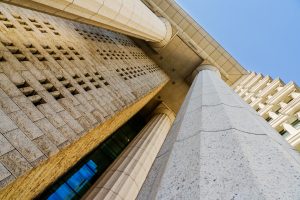[On June 8, 2020, Law 27,548 was published in the Official Gazette of the Argentine Republic, enacted by the Congress on May 21, 2020, which aims to create the “Program for the Protection of Health Personnel against the COVID-19 Coronavirus Pandemic”.
- Provisions
Law No. 27,548 (hereinafter, the “Law”) declares as a priority for the national interest the protection of the life and health of the personnel of the Argentine health system and of the workers and volunteers who perform essential activities and services during the health emergency caused by the COVID-19 coronavirus pandemic.
The main objective of the Program created by the Law is the prevention of COVID-19 Coronavirus infection among health personnel working in public or private health facilities, and among workers and volunteers providing essential services during the health emergency.
According to Article 4 of the Law, health facilities must guarantee biosecurity measures. Priority should be given to those areas of the facilities specifically dedicated to the care and sampling of suspected or confirmed cases of COVID-19, as well as to those areas where there is a higher risk of contagion.
Regarding the Authority of Application, Article 5 of the Law delegates to the National Executive Power to determine who will be the authority of application of the law. Article 6° establishes the powers and duties of this authority. These include the following:
a) Establish mandatory protocols for the protection of health personnel, practice guidelines for the handling and use of supplies, and any other regulations it deems necessary, which have the following characteristics
The objective is to minimize the risk of contagion in the care of suspected cases, sample collection and testing, care and treatment of patients with COVID-19;
b) Coordinate with the provincial and municipal jurisdictions and with the Superintendence of Health Services the implementation of mandatory training for all personnel covered by this law;
c) Coordinate with companies, universities, trade unions and civil organizations to carry out mandatory training in accordance with the provisions of Article 7 of this law;
d) Establish a permanent digital advisory team for the protection of health personnel, for those establishments that require it in the event of a health emergency;
e) Implement a continuous and systematic diagnostic protocol focused on health personnel who provide services in establishments where care of suspected cases is provided, where samples or tests are performed, and where care and treatment of patients with COVID-19 is provided, or who are located in areas of community circulation of the virus. The analysis of diagnostic tests of health personnel will have absolute priority in their performance and reporting by authorized laboratories;
f) To keep the Unified Registry of Health Personnel infected by COVID-19 under the orbit of the National Health Surveillance System, with the purpose of keeping updated information on contagion among health personnel in real time. It should indicate the activity of the infected personnel, detailing services and guards, type of establishment where they rendered services and any other useful information to identify the epidemiological link and possible contacts;
g) Collaborate with the purchase of personal protection equipment and critical supplies according to the epidemiological situation of each jurisdiction.
In relation to the budgetary aspect of the Law, this is contemplated in Article 8°, which states generically that “The expenses required to comply with this law during the fiscal year in force at the time of its enactment shall be met with the resources of the national budget, for which purpose the Chief of the Cabinet of Ministers shall make the necessary budgetary restructurings. Subsequent budgets shall provide for the necessary resources to comply with the objectives of the present law, through the inclusion of the respective program in the corresponding jurisdiction. The implementing authority may receive donations of financial and material resources made by national and international non-governmental organizations, international or cooperation agencies and profit or non-profit organizations or entities with activities in our country”.
In addition, the Law establishes that it will be in force during the sanitary emergency caused by the COVID-19 Coronavirus, in accordance with the provisions of Article 1° of the Necessity and Urgency Decree 260/2020 or the regulation that may replace it in the future.
- Scope
The Law establishes that The Program shall be mandatory for all medical, nursing, management and administrative, logistic, cleaning, gastronomic, ambulance and other personnel providing services in health facilities where practices are carried out for the care of suspected cases, sampling and testing, and/or care and treatment of COVID-19, regardless of the person in charge and the legal form of the facility, in facilities and institutions under the National Government’s jurisdiction.
In turn, Article 10 invites the provinces and the Autonomous City of Buenos Aires to adhere to the law, since it is not in itself binding for them, due to the fact that in health matters, because of the federal organization of Argentina, the provinces retain the so-called “police power” to regulate the practice of the professions.[:]



